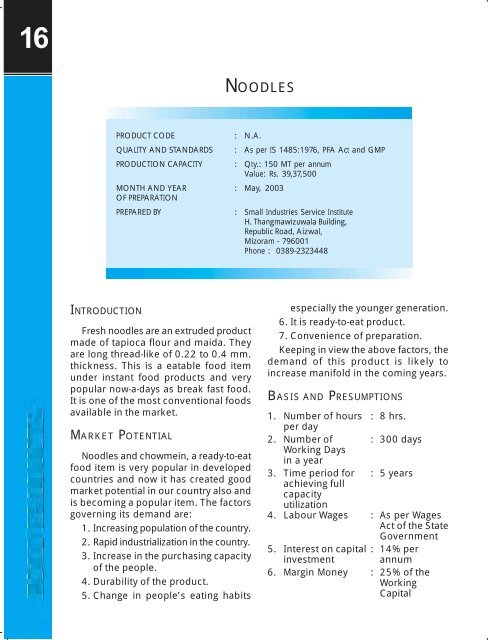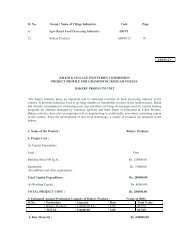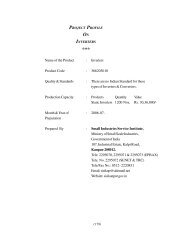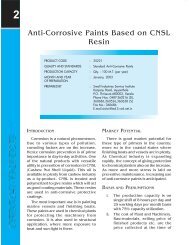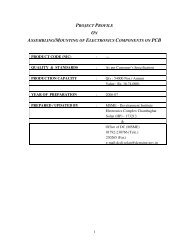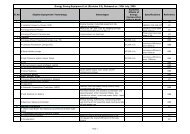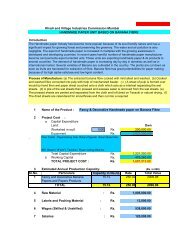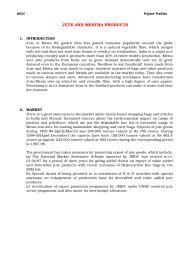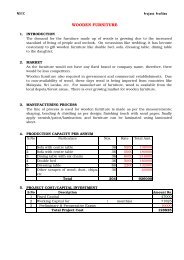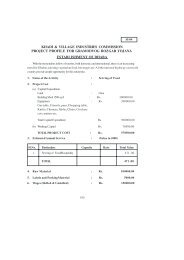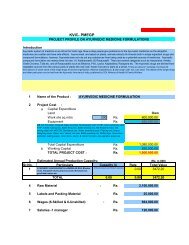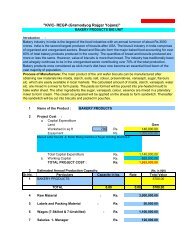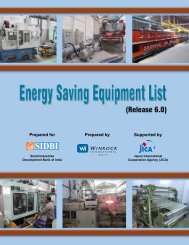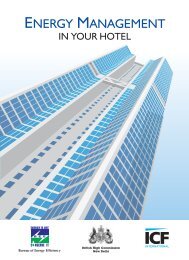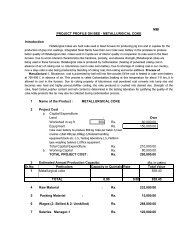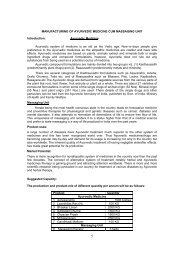Create successful ePaper yourself
Turn your PDF publications into a flip-book with our unique Google optimized e-Paper software.
16<br />
<strong>NOODLES</strong><br />
PRODUCT CODE : N.A.<br />
QUALITY AND STANDARDS : As per IS 1485:1976, PFA Act and GMP<br />
PRODUCTION CAPACITY : Qty.: 150 MT per annum<br />
Value: Rs. 39,37,500<br />
MONTH AND YEAR : May, 2003<br />
OF PREPARATION<br />
PREPARED BY : Small Industries Service Institute<br />
H. Thangmawizuwala Building,<br />
Republic Road, Aizwal,<br />
Mizoram - 796001<br />
Phone : 0389-2323448<br />
INTRODUCTION<br />
Fresh noodles are an extruded product<br />
made of tapioca flour and maida. They<br />
are long thread-like of 0.22 to 0.4 mm.<br />
thickness. This is a eatable food item<br />
under instant food products and very<br />
popular now-a-days as break fast food.<br />
It is one of the most conventional foods<br />
available in the market.<br />
MARKET POTENTIAL<br />
Noodles and chowmein, a ready-to-eat<br />
food item is very popular in developed<br />
countries and now it has created good<br />
market potential in our country also and<br />
is becoming a popular item. The factors<br />
governing its demand are:<br />
1. Increasing population of the country.<br />
2. Rapid industrialization in the country.<br />
3. Increase in the purchasing capacity<br />
of the people.<br />
4. Durability of the product.<br />
5. Change in people’s eating habits<br />
especially the younger generation.<br />
6. It is ready-to-eat product.<br />
7. Convenience of preparation.<br />
Keeping in view the above factors, the<br />
demand of this product is likely to<br />
increase manifold in the coming years.<br />
BASIS AND PRESUMPTIONS<br />
1. Number of hours : 8 hrs.<br />
per day<br />
2. Number of : 300 days<br />
Working Days<br />
in a year<br />
3. Time period for : 5 years<br />
achieving full<br />
capacity<br />
utilization<br />
4. Labour Wages : As per Wages<br />
Act of the State<br />
Government<br />
5. Interest on capital : 14% per<br />
investment annum<br />
6. Margin Money : 25% of the<br />
Working<br />
Capital
<strong>NOODLES</strong><br />
95<br />
7. Pay back period : 7 years<br />
of the Project<br />
IMPLEMENTATION SCHEDULE<br />
1. Building construction 3 Months<br />
2. Preparation of Project 1 Month<br />
report and SSI Registration<br />
3. Financial assistance 3 Months<br />
4. Arrangement of power 1 Month<br />
5. Acquisition of Machinery 1 Month<br />
6. Installation of Machinery 15 Days<br />
7. Appointment of Staff 1 Month<br />
and Labour<br />
8. Trial production and 2 Weeks<br />
shooting problems<br />
9. Commercial production 1 Week<br />
after trial<br />
production<br />
10.Total time to start 3 to 6<br />
commercial production Months<br />
TECHNICAL ASPECTS<br />
Process of Manufacture<br />
Noodles is the term being used to<br />
designate products made from blend of<br />
flours, the major component of which<br />
is tapioca flour and maida. A noodle is<br />
manufactured in different sizes, hollow<br />
as well as solid, for different cooking<br />
methods. Some are made for cooking<br />
and others are for frying. The noodles<br />
proposed in this Profile are for frying.<br />
Typical Blending for 16 Kg. of Product<br />
Maida : 8 Kgs.<br />
Starch : 7 Kgs.<br />
Sodium bicarbonate : 850 gms.<br />
Salt : 150 gms.<br />
Edible colour : Q.S.<br />
Process in Detail<br />
Dry Mixing<br />
The average moisture content of dry<br />
mixes is 10-11%. The three ingredients<br />
maida, starch and soda bicarbonate are<br />
blended in a vertical mixer alongwith<br />
edible colour.<br />
Dough Formation<br />
Satisfactory dough can be made from<br />
the above blend only by using boiled<br />
water, when a part of the starch is<br />
gelatinized. The ingredients are mixed<br />
in dough mixer for about 12 to 15<br />
minutes.<br />
Extrusion<br />
The kneaded dough is then<br />
transferred to noodles making machine<br />
where extruded material of desired<br />
shape and length is obtained by using<br />
an appropriate type of die and suitably<br />
adjusting the distance between the dye<br />
surface and cutting blade. The moisture<br />
content of the product at this stage is<br />
about 33%.<br />
Pre-drying<br />
The cut noodles goods from the<br />
cutting machine fall on wooden trays.<br />
The product undergoes surface drying<br />
and becomes sufficiently hard enough<br />
to be handled without sticking or being<br />
crushed. The moisture content of the<br />
pre-dried product is about 29.5%.<br />
Drying<br />
The pre-dried product is finally semidried.<br />
The moisture content of the
96<br />
<strong>NOODLES</strong><br />
product will be 17%. Drying is done by<br />
exposure to indirect sunrays or placing<br />
in shade. The noodles dried as above<br />
do not have a satisfactory cooking quality<br />
and undergo a heavy loss on cooking.<br />
This can be reduced considerably by<br />
giving heat treatment to the product.<br />
This is optioned as this gives a brown<br />
colour to the product which may not be<br />
appealing to some of the customers.<br />
Recent development in the<br />
manufacture of noodles is that the<br />
product is exposed to steam. The<br />
steamed product has three advantages:<br />
(1) longer shelf-life (2) harder grain, and<br />
(3) better eating quality than unsteamed<br />
product. Steaming is done by exposing<br />
the product in thin layer to steam for<br />
about 15 minutes. The steamed and<br />
subsequently dried product has a<br />
moisture content of about 10%. The<br />
steaming is done before the product is<br />
semi-dried.<br />
Quality Control and Standards<br />
The product must meet PFA<br />
specifications. However, BIS specification<br />
for Noodles is IS: 1485:1976.<br />
Production Capacity<br />
Qty. per Value per<br />
annum annum<br />
(In Rs.)<br />
Fresh Noodles 150 MT 39,37,500<br />
Motive Power<br />
30 HP<br />
Pollution Control<br />
It is not required as the product is<br />
not causing any air, water and sound<br />
pollution. However, entrepreneurs<br />
should obtain NOC from concerned<br />
State Pollution Control Board.<br />
Energy Conservation<br />
Proper insulation is to be made to<br />
reduce the heat loss during drying and<br />
steaming processes.<br />
FINANCIAL ASPECTS<br />
A. Fixed capital<br />
i) Land and Building Amount (In Rs.)<br />
Land 1000 Sq. Mts. @ Rs. 100 1,00,000<br />
Cost of construction of shed 6,75,000<br />
225 sq mtr. @ Rs. 3000 Sq. Mtr.<br />
Total 7,75,000<br />
ii) Machinery and Equipment<br />
Sl. Description<br />
No.<br />
Amount<br />
(In Rs.)<br />
1. Vertical type powder 22,000<br />
mixer 500 kgs. cap<br />
with motor complete<br />
2. Dough mixer blade type 44,000<br />
75 kgs. cap<br />
3. Noodles making power 2,20,000<br />
operated machine with<br />
different size die-heads<br />
4. Wooden trays 1000 pcs. size 2'×3' 16,500<br />
5. Plastic Buckets 4 each of 1,000<br />
20 liters cap.<br />
6. Aluminium/Galvanised 34,500<br />
iron water tape pipe line fittings<br />
7. Water boiler-fuel heated 11,000<br />
75 litres cap.<br />
8. Installation of machinery 3,000<br />
and equipment<br />
9. Office furniture etc. 22,000<br />
iii) Pre-operative Expenses<br />
Total 3,74,000<br />
Amount<br />
(In Rs.)<br />
Legal expenses, start-up expenses, 35,000<br />
establishment cost, consultancy fee,<br />
estimate fee, interest and<br />
trial runs, etc.
<strong>NOODLES</strong><br />
97<br />
Total Fixed Capital<br />
Amount<br />
(In Rs.)<br />
1. Land and Building 7,75,000<br />
2. Machinery and Equipment 3,74,000<br />
3. Pre-operative Expenses 35,000<br />
Total 11,84,000<br />
B. Working Capital (per month)<br />
i) Personnel<br />
Sl. Designation No. Salary Total<br />
No. (In Rs.) (In Rs.)<br />
i) Manager 1 5000 5,000<br />
ii) Supervisor 1 2500 2,500<br />
iii) Chemist 1 2500 2,500<br />
iv) Clerk 2 2500 5,000<br />
v) Peon/Watchman 1 1500 1,500<br />
vi) Skilled Workers 2 2000 4,000<br />
vii) Unskilled Workers 4 1500 6,000<br />
ii)<br />
Total 26,500<br />
Perks @ 15% of Salaries 3,975<br />
Total 30,475<br />
Raw Materials including Packaging<br />
Requirements<br />
Sl. Parti- Indige- Qty. Rate Total<br />
No. culars nous/ (In Rs.)<br />
Imported<br />
i) Maida Indigenous 13 MT 8000 1,04,000<br />
ii) Starch -do- “2 MT 9000 18,000<br />
iii) Chemicals, -do- L.S. – 6,000<br />
salt, etc.<br />
iv) Packaging -do- L.S. – 30,000<br />
Material<br />
Total 1,58,000<br />
iii) Utilities<br />
Amount (In Rs.)<br />
i) Power 5,000<br />
ii) Fuel 1,500<br />
iii) Water 500<br />
Total 7,000<br />
iv) Other Contingent Expenses Amount<br />
(In Rs.)<br />
i) Postage and Stationery 1,000<br />
ii) Telephone 1,000<br />
iii) Consumable Stores 1,000<br />
iv) Repairs and Maintenance 1,500<br />
v) Transport Charges 7,000<br />
vi) Insurance 1,500<br />
vii) Sales Expenses 3,000<br />
viii) Miscellaneous Expenditure including 7,000<br />
advertisement, legal fee and<br />
entertainment charges<br />
Total 23,000<br />
v) Total Recurring Expenditure 2,18,475<br />
(per month)<br />
vi) Total Working Capital 6,55,425<br />
(for three months)<br />
C. Total Capital Investment<br />
Amount<br />
(In Rs.)<br />
i) Fixed Capital 11,84,000<br />
ii) Working Capital 6,55,425<br />
(For three months)<br />
Total 18,39,425<br />
MACHINERY UTILISATION<br />
The bottleneck operation in the<br />
manufacturing process is extrusion. The<br />
unit will utilize 75% of the installed<br />
capacity.<br />
FINANCIAL ANALYSIS<br />
1. Cost of Production (per year) Amount<br />
(In Rs.)<br />
1. Total recurring cost per year 26,21,700<br />
2. Depreciation on building @ 5% 33,750<br />
3. Depreciation on M/C @ 10% 35,200<br />
4. Depreciation on office equipment 4,400<br />
@ 20%<br />
5. Interest on total capital 2,57,520<br />
investment @ 14%<br />
Total 29,52,570
98<br />
<strong>NOODLES</strong><br />
2.Turn Over (per year)<br />
Item Qty. Rate Amount<br />
(In Rs.) (In Rs.)<br />
Fresh Noodles in 7.50 5.25 39,37,500<br />
200 gms. Packets lakh pkts<br />
3.Net Profit (per year)<br />
= Sales – Cost of production<br />
= 39,37,500 – 29,52,570<br />
= 9,84,930<br />
4. Net Profit Ratio<br />
= Net profit per year × 100<br />
Turn Over per year<br />
= 9,84,830 × 100<br />
39,37,500<br />
= 25.01%<br />
5. Rate of Return<br />
= Net profit per year × 100<br />
Total investment<br />
= 9,84,930 × 100<br />
18,39,425<br />
= 53.5%<br />
6.Break-even Point<br />
Fixed Cost<br />
Amount<br />
(In Rs.)<br />
(a) Depreciation on Building @ 5% 33,750<br />
(b) Depreciation on Machinery 35,200<br />
(c) Depreciation on Office Equipments 4,400<br />
(d) Interest on Total Investment 2,57,520<br />
(e) Insurance 18,000<br />
Fixed Cost<br />
Amount<br />
(In Rs.)<br />
(f) 40% of salary and wages 1,46,280<br />
(g) 40% of other contingent expenses 1,10,400<br />
Total 6,05,550<br />
B.E.P.<br />
= FC × 100<br />
FC + P<br />
= 6,05,550 × 100<br />
6,05,550 + 9,84,930<br />
= 38.07%<br />
Addresses of Machinery and<br />
Equipment Suppliers<br />
1. M/s. Mona Machinery Mfg. Co.<br />
Chandralok, 111 SD Road,<br />
Secunderabad.<br />
2. M/s. Khan Engg. Works<br />
5-5-274 Namally,<br />
Near Gandhi Bhavan,<br />
Patel Nagar,<br />
Hyderabad.<br />
3. M/s. Shanti Turning Works<br />
4-1-590/12, Troop Bazar,<br />
Hyderabad-500001.<br />
4. M/s. Mahalaxmi Engg. Works<br />
Craftman, Gylid, Mallepally,<br />
Hyderabad.<br />
5. M/s. Debdoot India<br />
67-B, Biddan St.,<br />
Kolkata - 700006.<br />
Raw Material Suppliers<br />
Local Market.


